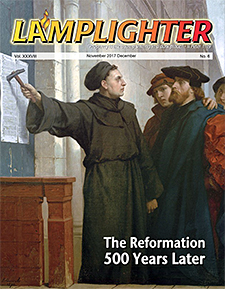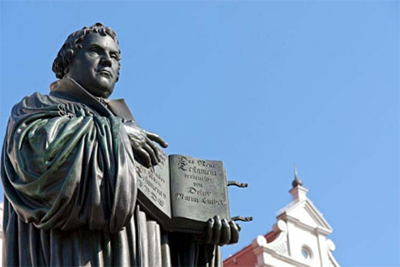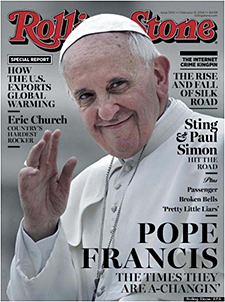The Abandonment of the Reformation
The Vatican’s Strategy to Reverse the Reformation
By Mike Gendron


Mike Gendron was a devout Roman Catholic and a strong defender of the “one true church” for 34 years before he developed a personal relationship with Jesus in 1981.
He left the Catholic Church in 1985, and in 1988 he left a successful career in corporate management to study at Dallas Theological Seminary. Four years later he formed Proclaiming the Gospel Ministries with the primary goal of reaching Catholics with the Gospel.
You can get on his mailing list and find a complete listing of all his books and video albums at his ministry’s website: www.pro-gospel.org.
As we celebrate the 500th anniversary of the Reformation, it is gravely disturbing that many Christians are abandoning the essential Gospel truths that the Reformers gave their lives defending.
There are other Christians who believe the Reformation was a costly mistake because it divided the Church. They are now seeking to reverse the Reformation and reunite with the Roman Catholic Church.
What is causing this lack of discernment? Why are the doctrinal differences that were once black and white, now becoming gray? How can those who have been sanctified by the truth desire unity with an apostate church? Is it because people do not know how exclusive the true Gospel is? Or do they just not know how false and fatal the gospel of Rome is?
The Reformers departed from the Roman Catholic Church primarily on the basis of two important biblical doctrines: 1) the supreme authority of Scripture, and 2) justification by faith alone in Christ alone.
The Reformers boldly asserted that Scripture has authority over the teachings and traditions of the Catholic Church. They also reclaimed the purity of the Gospel whereby repenting sinners can become right with God by grace alone through faith alone.

The Significance of the Word “Alone”
The glorious Gospel of Jesus Christ had been hidden under the religious traditions of the Catholic Church for over 1000 years. Rome had long taught that sinners are saved by grace plus merit, through faith plus works, in Christ plus other mediators, according to Scripture plus tradition, for the glory of God plus Mary.
The Reformers renounced the false and fatal gospel of Catholicism by proclaiming salvation is by grace alone, through faith alone, in Christ alone, according to Scripture alone, all for the glory of God alone.
In a similar way, the apostle Paul drove a stake in the ground to protect the purity and exclusivity of the Gospel 2000 years ago. Using the most strident and inflexible language of his ministry he wrote: “…there are some who are disturbing you and want to distort the Gospel of Christ. But even if we, or an angel from heaven, should preach to you a Gospel contrary to what we have preached to you, he is to be accursed!” (Galatians 1:7–8).
Clearly, the Roman Catholic Church falls under this divine condemnation. It has distorted the Gospel by adding additional requirements for salvation, including: sacraments, good works, keeping the law, purgatory and indulgences.
The Spark That Ignited the Reformation
When Martin Luther could no longer allow God’s forgiveness to be treated so disdainfully, he nailed his 95 Theses to the door of the Castle Church in Wittenberg. The church had over 1900 relics on display which included the bones and skin, hair and fingernails and even the heads of saints. Catholics were granted indulgences for the remission of their sins if they viewed the relics and made confession to a priest.
Luther’s initial protest exposed the pope’s abominable practice of selling salvation from purgatory’s fire for the price of indulgences. Through the sale of indulgences, divine forgiveness was sold like any commodity in the marketplace. Because of such widespread corruption and heresy in the Catholic Church, the Doctrine of Justification became the defining doctrine of the Reformation.
The Doctrine of Justification is said to be the hinge upon which the gates of heaven open and close. Those who are wrong about justification end up with a false and fatal gospel.
The Catholic Church not only got justification wrong, they condemned anyone who embraced the biblical doctrine of justification by faith on the basis of the imputed, legal righteousness of Christ. In its place, Rome taught an infused, moral righteousness that was initiated by water baptism, lost by mortal sin, and regained through the sacraments, until perfect righteousness could be attained.
Rome’s doctrine of justification was diametrically opposed to the biblical doctrine. One was revealed by God, the other invented by men; one was by grace, the other by merit, one based on the finished and sufficient work of Christ, the other on the imperfect works of sinful men. The Reformers relied on the truth of God’s Word to expose the error of lawless men just as light dispels the evil deeds of darkness.
Why Is the Reformation Being Abandoned Today?
Since 1965, the Vatican has been carrying out a well defined strategy to reverse the reformation through its decree on ecumenism. They have successfully persuaded Evangelical leaders to sign numerous unity accords with Catholics which declare that all branches of Christianity share a common faith in the Gospel. Needless to say, this is a tragic betrayal of the Gospel that many Reformers died defending.
Even more tragic is the fact that Evangelicals are the ones who are compromising the truth of God’s Word while the Catholic Church continues to stand rigidly on its “infallible” dogmas that deceive people who have little or no discernment.
Biblical ignorance and the lack of discernment are producing fertile ground for deception and apostasy. There are many Evangelical churches that no longer faithfully preach the whole counsel of God verse by verse.
When Christians are not fed a steady diet of God’s Word, they will not get the truth, and when they don’t know the truth, they cannot discern truth from error. Those who lack discernment will be the first to jump on the ecumenical bandwagon and abandon the doctrines that divide believers from unbelievers.
Consider the words of Pastor Andy McQuitty of Irving Bible Church in Texas, “The rift that occurred between Catholics and Protestants 500 years ago is ‘theological pettiness.’ We’ll have plenty of time in Heaven to figure out who was right about Purgatory and Mary” (The Chatter, May 2005).
This is not an isolated case of betrayal. A survey by Life Way Research of 1,000 senior evangelical pastors revealed almost two–thirds of them say Pope Francis is their brother in Christ. More than one–third say they value the pope’s view on theology, and that he has improved their view of the Catholic Church.
This abandonment of Reformation theology is pathetic when the compromisers are contrasted with Martin Luther’s profound view of the papacy. He boldly proclaimed, “The Pope is the very Antichrist, who has exalted himself above, and opposed himself against Christ because he will not permit Christians to be saved without his power …To lie, to kill, and to destroy body and soul eternally, that is where his papal government really consists” (Article IV, The Smalcald Articles).

The Vatican’s Strategy to Reverse the Reformation
The Catholic Church no longer calls all Protestants “heretics” because they are trying to reverse the Reformation. Instead, we are now referred to as “separated brethren” in order to seduce us to come back home to Rome for the “fullness” of salvation.
Their strategy is to persuade highly visible Evangelicals to promote Catholicism as a valid expression of Christianity. Another part of their strategy is to beguile people with Catholic mysticism, contemplative spirituality and postmodernism.
Our postmodern culture promotes pluralism, moral relativism, and tolerance while rejecting absolute authority and objective truth. This plays right into Rome’s strategy to unite all professing Christians under the papacy.
What Are We to Do?
We must remain sanctified by the truth of God’s Word (John 17:17). God has called His people out of the kingdom of darkness into the glorious light of His Son. We must resist all movements to unite with unbelievers in spiritual enterprises (2 Corinthians 6:14–18).
We can never have unity with Catholics because we are divided on the essentials of the Gospel, on how one is born again, on how one is justified, on how one is purified of sin and on who mediates between God and man.
We are divided on the efficacy, sufficiency and necessity of Jesus Christ. Every born–again Christian needs to enlist in the Lord’s army to fight the good fight of faith (1 Timothy 6:12).
We need to increase our passion and love for the truth and contend earnestly for the faith against the winds of apostasy. We must defend the glory, honor and name of our Lord Jesus Christ and protect the purity and exclusivity of the Gospel. Finally, we need to be faithful to the great commission and evangelize the many victims of religious deception!




